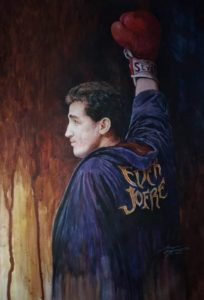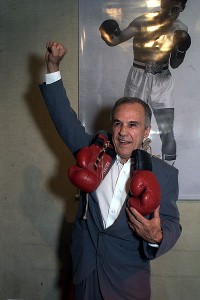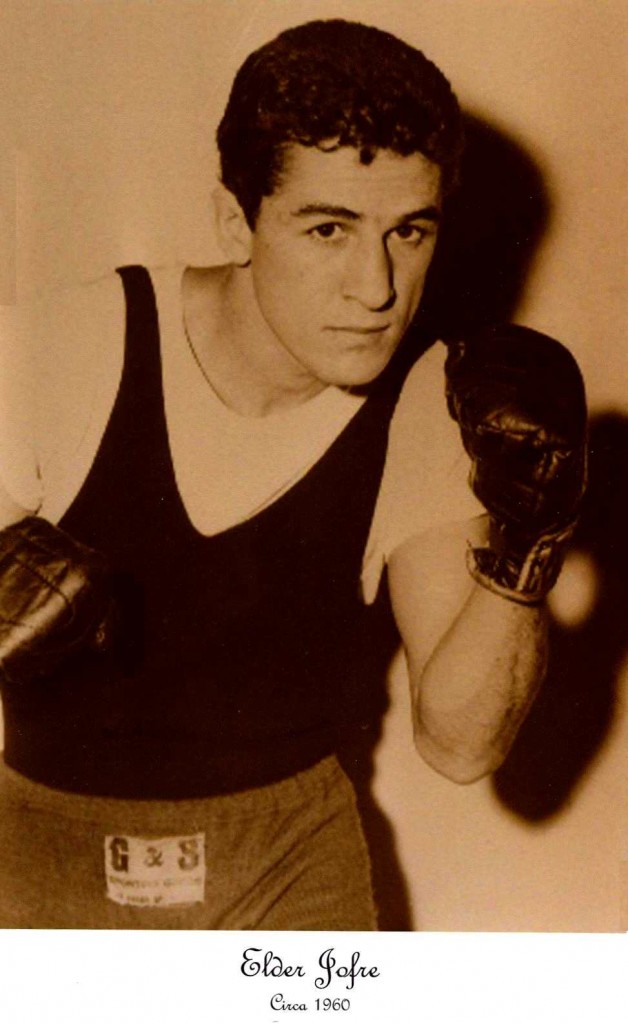Rest in Peace Eder Jofre, Former Bantamweight and Featherweight Champion and Hall of Fame Inductee
By Chris Smith
 Eder Jofre, former world bantamweight world champion (1960-1965) and featherweight champion (1973-1974), passed away in the early hours of Sunday, October 2, 2022 in his native Brazil. The cause of death was complications from pneumonia which Jofre had contracted in March of this year. He was severely weakened by the illness and stayed in the hospital until he took his final breath.
Eder Jofre, former world bantamweight world champion (1960-1965) and featherweight champion (1973-1974), passed away in the early hours of Sunday, October 2, 2022 in his native Brazil. The cause of death was complications from pneumonia which Jofre had contracted in March of this year. He was severely weakened by the illness and stayed in the hospital until he took his final breath.
Jofre was born in São Paulo on March 26, 1936, the son of a former boxer and gym owner Jose Aristides “Kid” Jofre, an Argentine of Spanish and French Basque origins, and Angelina Jofre (née Zumbano), daughter of Italian immigrants and member of one of the most prominent boxing families in South American boxing history.
In 2019, this organization (IBRO) polled its members, and Jofre came out overwhelmingly on top in the all-time bantamweight rankings in first place and 16th in its pound-for-pound rankings. That rating is put into better perspective when you consider that he placed higher than modern greats such as Floyd Mayweather, Marvelous Marvin Hagler, Manny Pacquaio, Roy Jones, Carlos Monzon, Julio Cesar Chavez, etc. It’s conceivable he was sold short on the list given that he never fought on American TV or was heard on American radio, and he competed in a weight class that was often neglected by American fight fans who often tend to gravitate to the higher weight classes.
Jofre, Brazil’s only International Boxing Hall of Fame inductee, was a phenomenal fighter. Almost too good to be true really. He possessed elite offensive skills while being an excellent defensive fighter, power in both hands, near flawless technique, a savant-like boxing brain, and was about as professional a boxer as there has ever been.
Eder had a successful amateur career culminating in representing his country at the 1956 Melbourne Olympics. He turned professional with a good amount of media support in Brazil, but it took a few years before his name was recognized outside of South America. He etched his name into Brazilian history on November 18, 1960, when he won the world bantamweight championship (NBA) by defeating Eloy Sanchez via 6th round KO. He drew 35,000 fans to Brazil’s first world title match when he defended in Rio di Janeiro against Piero Rollo on March 22, 1961, winning via 9th round TKO and became the undisputed world bantamweight champion on January 18, 1962, when he thrashed the unbeaten John Caldwell in 10 rounds.
Jofre ruled the division with an iron-clad fist, earning global recognition as the world’s best fighter pound-for-pound, defending his title in places such as San Francisco, Japan, the Philippines, Venezuela, and Colombia. In 1965, he was finally dethroned when Fighting Harada edged him on a split decision in Nagoya, Japan. Harada turned the trick again the following year in Tokyo, which resulted in Jofre retiring. He was tempted out of retirement in 1969 at the age of 33 and amassed arguably boxing’s greatest comeback, going 25-0 until his final fight in 1976. The highlight of the comeback was when he upset the odds to beat the excellent Jose Legra for the world featherweight title on May 5, 1973, in Brasilia. His lone defense of that title was when he knocked out fellow hall-of-famer Vicente Saldivar in four rounds. Overall, Jofre was 72-2-4 (KO 50).
Many reading this piece will know of my connection to Eder Jofre. Last year I released the biography Eder Jofre: Brazil’s First Boxing World Champion. I also wrote a diary of events for a previous journal from when I hosted Eder and his two children in Los Angeles in October 2021 when he was inducted into the West Coast Boxing Hall of Fame. I would be remiss not to share some of the personal touches I experienced with this great champion. While he was with me, I would make the point to ask him, “How are you doing? Are you happy? And he responded, “Happy. Very, very happy.” He told me, “I am the happiest man in the world.” When saying farewell at the airport, we put Eder in his wheelchair, and I said goodbye to them and thanked them for coming. Eder said, “Thanks for what?” Part of me was wondering if he had even known where he had been the past week until I said: “For coming here and for gracing us with your presence.” He said to me: “No, I am the one who has to thank you for everything you did for me.”
Beyond his incredible boxing ability and legendary career, there was much more to Jofre. He was a highly skilled artist, having taken to pencil drawing as a youngster. He was, by all accounts, an excellent football player. However, what really stands out about Jofre is the type of human being he was. His father told him as a child: “Whatever you do, don’t treat people wrong, don’t envy others and don’t steal from people, be kind to others and help where you can.”
 Throughout my research, some of the standout pieces of generosity were when he used his receiving a national award as a platform to try and help the boxers who were not established in an attempt to help the sport for years to come. There was also volunteer work he participated in order to keep the youth away from drugs and dangerous lifestyles. That work led to his entering the murky world of politics as an Alderman for the city of São Paulo. He pleaded at first that he didn’t go to school for it and didn’t really know politics, but when he was told he could lend his name and because his name had value, he could use that to help on a larger scale. He wrote important laws, such as ensuring a step for elderly people on public transport and access to first aid at sports events. When he left the cabinet, he did so with a clean image and reputation. A friend of mine read the book and said, “I enjoyed it, but you didn’t put any of the dirt in.” In reality, it wasn’t that I didn’t put any dirt in. There was no dirt. I found from working with the Jofre family they were extremely kind and humble, two obvious traits passed down from their father and his father before him. I also found that they were extremely graceful and helpful.
Throughout my research, some of the standout pieces of generosity were when he used his receiving a national award as a platform to try and help the boxers who were not established in an attempt to help the sport for years to come. There was also volunteer work he participated in order to keep the youth away from drugs and dangerous lifestyles. That work led to his entering the murky world of politics as an Alderman for the city of São Paulo. He pleaded at first that he didn’t go to school for it and didn’t really know politics, but when he was told he could lend his name and because his name had value, he could use that to help on a larger scale. He wrote important laws, such as ensuring a step for elderly people on public transport and access to first aid at sports events. When he left the cabinet, he did so with a clean image and reputation. A friend of mine read the book and said, “I enjoyed it, but you didn’t put any of the dirt in.” In reality, it wasn’t that I didn’t put any dirt in. There was no dirt. I found from working with the Jofre family they were extremely kind and humble, two obvious traits passed down from their father and his father before him. I also found that they were extremely graceful and helpful.
Until the end, Jofre maintained a healthy lifestyle, which prior to Covid included two to three gym visits per week and, while in lockdown, light exercises at home, often with the boxing gloves on. However, he showed early signs of CTE in 2010 when he started to forget basic things, such as where he left his car keys or what he needed to get from the supermarket. This worsened severely in 2013 when his wife of 52 years Cidinha passed away, and he suffered from depression. He let his diet slip and showed alarming physical and mental deterioration, thought to be Alzheimer’s. Through the support of his family and with the help of doctors Renato Anghinah and Bernardino Santi, they found his CTE had accelerated. Still, they were able to find the proper medication to improve his situation. He lived happily in his twilight years, seeing a movie (10 Segundos para Vencer) on his life released in 2018, the first English book released on his life (the aforementioned Eder Jofre: Brazil’s First Boxing World Champion), and the return to Los Angeles, something he’d wanted to do for years. His life was spent around loved ones, and he always received warm applause at public events.
He was 86 years old and is survived by his two children, Marcel and Andrea.
